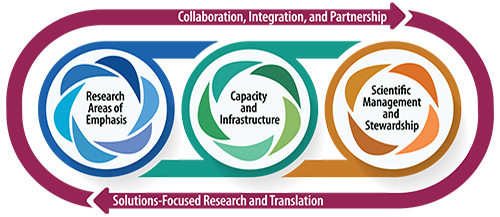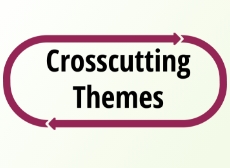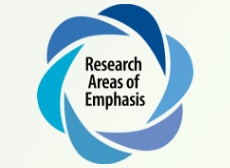The 2025-2029 NIEHS Strategic Plan, titled “Health at the Intersection of People and Their Environments,” is the result of a careful analysis of our prior accomplishments, ongoing efforts, and future aspirations. It was developed with extensive input from environmental and health scientists from across many disciplines, public health professionals, community and patient groups, and the public.
The Strategic Plan reflects a framework where Crosscutting Themes span Research Areas of Emphasis, Capacity and Infrastructure, and Scientific Management and Stewardship.

NIEHS values transparency and engagement in setting research priorities and supports collaborative community involvement in all aspects of the institute’s strategic planning work. Input from external parties is extremely important and was obtained in multiple ways, including through workshops, engagement at national meetings and other gatherings, legislative input and directives, community forums, collaboration with other NIH institutes, and various informal and formal advisory boards, including the National Advisory Environmental Health Sciences Council (NAEHSC) and the Board of Scientific Counselors (BSC).
NIEHS Senior Leadership will identify opportunities for coordination and collaboration across all divisions of the institute to implement the priority approaches reflected in this strategic plan. The initial focus of implementation will include NIEHS Senior Leadership and staff leading and contributing to implementation working groups organized around the research areas of emphasis. NIEHS Senior Leadership will identify opportunities for further implementation activities related to capacity and infrastructure and scientific management and stewardship, as well. NIEHS will also proactively pursue opportunities for collaboration and shared leadership of environmental health research relevant to the missions of other NIH ICOs. NIEHS will continue to leverage existing tracking systems and metrics, and explore novel ones where needed, to monitor our progress and to communicate about NIEHS activities to a wide range of audiences, including the public we serve.
Our Strategic Framework
The plan reflects a framework where Crosscutting Themes span Research Areas of Emphasis, Capacity and Infrastructure, and Scientific Management and Stewardship.

Crosscutting Themes
NIEHS is committed to collaborations and partnerships across its endeavors to successfully contribute to the critical work of NIEHS. This incorporates not just research and the generation of scientific knowledge, but the translation and dissemination of such knowledge.

Research Areas of Emphasis
NIEHS will conduct high-quality, innovative environmental health sciences research into the effects of the environment on biological systems and processes. These research areas of emphasis will further our understanding of the effects of the environment on biological systems and processes, and how the environment affects human health.

Capacity and Infrastructure
All NIEHS research activities depend on robust investments in capacity and infrastructure to ensure readiness for their success. Moving forward, these strategic priorities and approaches, including those related to the workforce, resources, and infrastructure, are key to accelerating advancements in the environmental health sciences.

Scientific Management and Stewardship
NIEHS prioritizes scientific stewardship and operational principles that align with the institute’s commitment to advancing human health and understanding the environment’s impacts on human health. The institute is committed to scientific management and stewardship in Public Trust in Science; Resource Stewardship & Sustainability; Review, Evaluation, and Assessment Capabilities; and Leadership Core Values.


